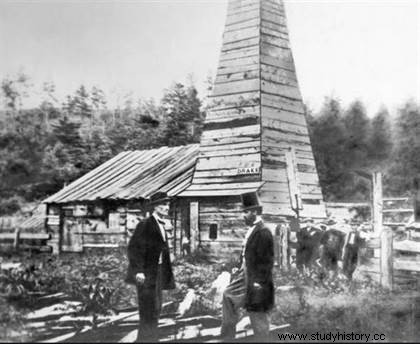 The discovery of oil dates back to antiquity. Wherever the oil-bearing rocks were exposed, bitumen was used as insulation. The Egyptians also used oil for mummification, the Mesopotamians as cosmetics and lighting fuel. The oil industry was officially born one day in the summer of 1859 when engineer Edwin Drake , an ex-railroad worker who claimed to be a colonel, saw oil surge from his drilling in Titus-ville, Pennsylvania.
The discovery of oil dates back to antiquity. Wherever the oil-bearing rocks were exposed, bitumen was used as insulation. The Egyptians also used oil for mummification, the Mesopotamians as cosmetics and lighting fuel. The oil industry was officially born one day in the summer of 1859 when engineer Edwin Drake , an ex-railroad worker who claimed to be a colonel, saw oil surge from his drilling in Titus-ville, Pennsylvania.
The history of oil:mummies from antiquity...
The Bible is the first to mention this fossil rock, which would have been used to cover Noah's ark. More than 3,000 years ago in Mesopotamia, the oil that rose to the surface in the form of bitumen seepage was used as mortar in the construction of ramparts, for caulking the hulls of ships and to seal cisterns and water pipes, as a source of energy and even as medicine. In Egypt, it was an essential ingredient in the long and complex process of mummification.
 In the Middle Ages, oil became a formidable weapon:the "Greek fires" of the Byzantines. These were terracotta grenades filled with oil and saltpetre that were thrown from a ship and exploded letting the oil escape. Ignited, the latter spread over the water and spread the fire to the other ships.
In the Middle Ages, oil became a formidable weapon:the "Greek fires" of the Byzantines. These were terracotta grenades filled with oil and saltpetre that were thrown from a ship and exploded letting the oil escape. Ignited, the latter spread over the water and spread the fire to the other ships.
In 1264, when he visited Baku (Azerbaijan), Marco Polo described the exploitation of surface oil, "collected in quantities which could fill hundreds of ships". As early as 1594, wells 35 meters deep were dug in this region. In 1830, there were 116 wells, which produced 720 barrels per day. Drake is not the first to drill by adapting the technique used in salt mines (a bit suspended at the end of a cable which transmits to it, from the surface, an alternating movement created by a pendulum):the engineer Russian Semyonov used this technique as early as 1854, still in Baku .
...to the big majors of the industrial era
The industrial revolution led to the search for new fuels; the social upheavals it caused created the need for inexpensive, good-quality kerosene for lamps. However, whale oil was only available to the wealthy, tallow candles had an unpleasant smell, and gaslights only existed in modern houses and apartments in urban areas. The search for a better lamp fuel led to a great demand for "rock oil" - i.e. crude oil - and by the middle of the 19th century many scientists were developing processes for commercial use.
 Thus began the search for larger sources of crude oil. It was known that wells dug for water and salt sometimes show oil seepage. The idea of oil drilling naturally made its way. The first wells were drilled in Germany in 1857. The initiative which met with the greatest repercussions, however, was that of Edwin L. Drake, on August 27, 1859, in Titusville, Pennsylvania. Drake drilled to find the "mother groundwater", the origin of the oil outcrops.
Thus began the search for larger sources of crude oil. It was known that wells dug for water and salt sometimes show oil seepage. The idea of oil drilling naturally made its way. The first wells were drilled in Germany in 1857. The initiative which met with the greatest repercussions, however, was that of Edwin L. Drake, on August 27, 1859, in Titusville, Pennsylvania. Drake drilled to find the "mother groundwater", the origin of the oil outcrops.
If Drake is celebrated as a founder, it is only because the nascent oil industry will be structured, in the United States, around large companies, including the Standard Oil by John Rockefelle r. It is these majors that will mobilize the capital necessary for exploration and the installation of heavy infrastructure in regions that are not very accessible. A strategy that will provide them with exorbitant political influence, in the countries where they will operate... just like in Washington.
Today, oil companies extract millions of barrels every day to supply global production, and to meet ever-growing demand despite environmental threats, research oil companies are turning to the disputed exploitation of shale oil.
To go further on the discovery of oil
- Black gold:the great history of oil, by Mathieu Auzanneau. Editions La Découverte, 2015.
